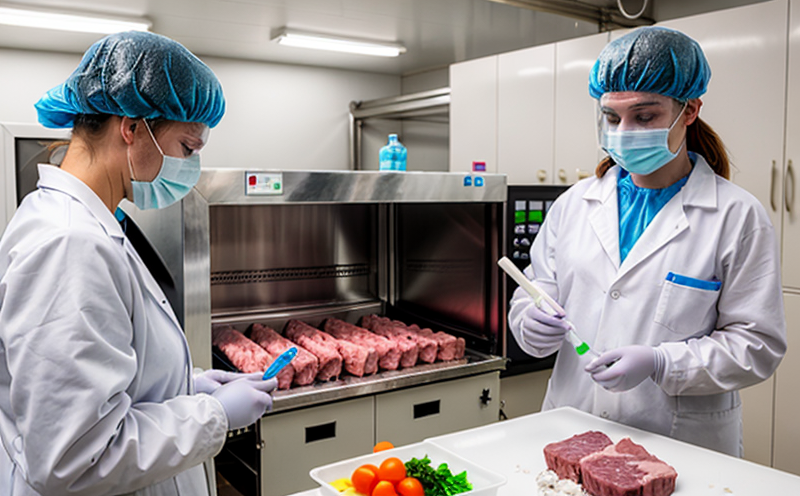ISO 21527-1 Yeasts and Moulds Enumeration in Meat and Dairy
The ISO 21527 series of standards provides a comprehensive approach to the enumeration of yeasts and moulds, including those of the genus Candida, in meat and dairy products. This particular standard, part one (ISO 21527-1), focuses on the quantitative estimation of yeast cells and mold spores in these foodstuffs.
The importance of this testing is paramount for ensuring product safety and quality control in the dairy and meat industries. Yeasts and molds can contribute to spoilage, affecting shelf life, sensory properties, and ultimately consumer satisfaction. Accurate enumeration helps manufacturers comply with international regulatory requirements while enhancing their reputation through superior food safety practices.
The methodology outlined in ISO 21527-1 involves several key steps: preparation of the sample, inoculation onto selective media, incubation conditions, and final counting using colony-forming unit (CFU) techniques. The standard specifies precise protocols to minimize bias and ensure reproducibility among laboratories.
For dairy products, particularly cheese and yogurt, the presence of specific yeast species such as Candida lipolytica can impart desirable flavors but also poses risks if overgrown or contaminated with undesirable molds. In meat products like sausage and pâté, control measures are essential to prevent spoilage due to microbial growth.
The testing process typically starts by homogenizing the sample followed by dilution in buffered peptone water (BPW). Subsequently, serial dilutions are spread onto Rose Bengal Chloramphenicol Agar (RB-CA) plates for yeasts and Malt Extract Agar (MEA) for molds. Incubation at appropriate temperatures—30°C for 48 hours or 25°C for up to 7 days—is required before enumeration.
The results yield colony counts expressed as CFUs per gram or milliliter, which are reported alongside metadata such as incubation temperature and time. These data help assess compliance with national and international food safety standards like Codex Alimentarius and EU legislation.
Understanding the microbial flora in dairy and meat products is crucial for optimizing production processes, extending shelf life, and maintaining product quality. By adhering to ISO 21527-1, laboratories ensure accurate enumeration of yeasts and molds, thereby contributing significantly to food safety and consumer confidence.
Industry Applications
| Industry Segment | Description |
|---|---|
| Dairy Processing | Evaluating the impact of microbial flora on product quality and shelf life. |
| Meat Processing | Monitoring spoilage factors in processed meats to ensure safe consumption. |
| Quality Assurance | Verifying compliance with international food safety standards. |
| R&D | Optimizing production processes by understanding microbial interactions. |
The enumeration of yeasts and molds in dairy and meat products is essential for maintaining product quality, extending shelf life, and ensuring compliance with regulatory requirements. This testing supports the development of safer and more consistent food products across various segments within the industry.
Eurolab Advantages
At Eurolab, our expertise in microbiological testing ensures accurate and reliable results for your ISO 21527-1 compliance needs. Our state-of-the-art facilities are equipped with advanced instrumentation and trained professionals who adhere strictly to international standards.
- ISO/IEC 17025 accreditation ensuring high-quality laboratory practices.
- Access to a wide range of specialized media for accurate yeast and mold enumeration.
- Experienced microbiologists providing expert interpretation of results.
- Comprehensive reporting services tailored to your specific requirements.
We pride ourselves on delivering consistent, accurate, and timely results that meet the stringent demands of the dairy and meat industries. Partner with Eurolab for dependable ISO 21527-1 testing solutions.
Why Choose This Test
- Comprehensive compliance with international standards like ISO 21527-1.
- Precision in yeast and mold enumeration ensuring product safety.
- Support for quality assurance programs enhancing consumer trust.
- Insight into microbial flora guiding process optimization efforts.
- Accurate results aiding in regulatory compliance audits.
- Expert interpretation of test outcomes informing decision-making processes.
- Timely delivery facilitating rapid implementation of corrective actions.
- Cost-effective long-term savings through improved product quality and reduced spoilage rates.
By choosing ISO 21527-1 yeast and mold enumeration, you gain a powerful tool for maintaining high standards in dairy and meat processing. This test offers invaluable insights into microbial activity, supporting continuous improvement initiatives within your organization.





